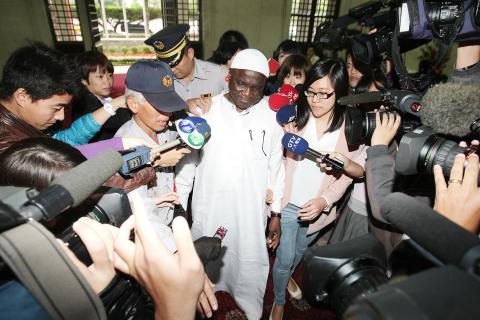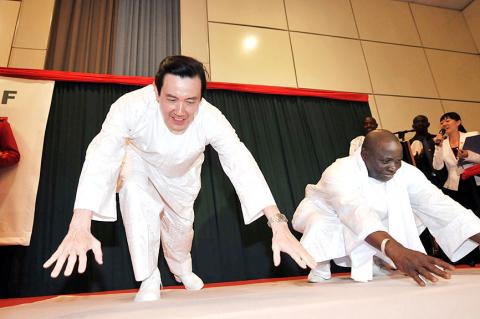President Ma Ying-jeou’s (馬英九) administration was caught by surprise yesterday when Gambian President Yahya Jammeh abruptly announced that the nation was severing ties with the Republic of China (ROC). However, the government was quick to state that China was not behind the move, as it faced a barrage of questions about its much-touted “flexible diplomacy.”
A statement from Jammeh’s office on Thursday said his government was cutting diplomatic ties with Taiwan with immediate effect, according to a Reuters report published at 5:42am Taipei time yesterday (9:42pm on Thursday in the Gambia).
The Gambia is the first country to break off relations with Taiwan since Ma assumed the presidency in May 2008, elected on his campaign of “flexible diplomacy,” which he described as a policy to ensure that Taiwan does not lose any more diplomatic allies because its signifies a “truce” with the People’s Republic of China (PRC) on the international arena.

Photo: CNA
“This was an isolated case. As things stand now, there seems to be no relation between the incident and mainland China,” Premier Jiang Yi-huah (江宜樺) said at a question-and-answer session at the legislature.
The government will strive to restore diplomatic ties with the Gambia, although “the chance is very slim” because Jammeh had announced the decision at a Cabinet meeting, Jiang said.
Bombarded with questions from lawmakers about the administration’s “flexible diplomacy,” Jiang said: “The problem is not with the policy of ‘flexible diplomacy’ itself... but we do need to find out what went wrong.”

Photo: CNA
Jiang said he had demanded that the Ministry of Foreign Affairs conduct a thorough review on why it did not know of the Gambia’s plan and give the public a clear account of what led to the incident.
The ministry should be held responsible, he added.
According to the Reuters report, Jammeh said in the statement that the “decision has been taken in our strategic national interest.”
“We are proud that we have been a very strong and reliable partner of the ROC (China) for the past 18 years, the results of which are there for every Taiwanese to see,” the statement said.
Despite the announcement, Jammeh said in the statement that the Gambia hoped to “remain friends” with the Taiwanese people.
That left the ministry struggling to explain why Jammeh decided to sever what he repeatedly called “solid, strong and cordial relations” over the past 18 years since the two countries resumed ties in 1995.
At a press conference at the ministry, Department of West Asian and African Affairs Director-General David Wang (王建業) said the status of relations between Taiwan and the Gambia at present was “suspended.”
The term was different to what Jammeh said in the note, with a letter to Ma attached, given to the ROC embassy in the Gambia, that his country “terminated” diplomatic ties with Taiwan, Wang said.
Right after Ambassador to the Gambia Samuel Chen (陳士良) received the note at 4pm on Thursday, state Radio Gambia made the announcement, and then Reuters picked up the news, Wang said.
Chen was not able to meet with Jammeh at the time to verify the note because Jammeh was at a meeting, but Chen had talked to a very high-ranking Gambian official before he sent the information back to Taipei, Wang said.
In Taipei, Gambian Ambassador to Taiwan Alhagie Ebrima Jarjou arrived at the ministry at 9:30am after being summoned by Minister of Foreign Affairs David Lin (林永樂).
Jarjou told reporters he had not been informed of his government’s decision.
Asked what prompted Jammeh’s decision and what role China played, Wang cited Jammeh’s letter to Ma. In the letter, Jammeh said his country was happy to see a significant reduction in cross-strait tensions and that Taiwan-China relations are now at its best since 1994, when he became president of the Gambia, Wang aid.
In light of the major progress in cross-strait ties, the Gambia decided to take a “neutral” position toward the interactions between Taiwan and China, Wang quoted Jammeh’s letter to Ma as saying.
Wang said the ministry has not seen any sign of Chinese involvement in Jammeh’s decision.
“Unlike before, the Gambia did not sign a communique that it was establishing diplomatic relations with Beijing,” Wang said, adding that the ministry was “keeping vigilant” to see how the situation evolves.
The national flag of the Gambia was briefly taken down from the lobby of the ministry’s building, where an array of national flags of the country’s all diplomatic allies were displayed, but later put back up.
During the 40-minute meeting with Jarjou, Lin asked him to seek further details about Jammeh’s move and convey the “solemn position” of the ROC government to Jammeh, ministry spokeswoman Anna Kao (高安) said.
Chen was instructed by the ministry to meet with Jammeh.
However, sources said that it was unlikely that Chen will see Jammeh anytime soon because the Gambian president is leaving for a summit with the heads of state in Asia and Africa next week.
Kao said the ministry would make an appropriate response to Jammeh’s decision “in line with the principle of maintaining our nation’s dignity” after the ministry conducts a thorough review of bilateral relations.
In the statement to the Gambia, the ministry said the ROC government expressed “shock” and “regret” about the immediate termination of bilateral ties.
Ma did not make any comment on the matter yesterday. The Presidential Office also maintained a low profile over the incident. The president met with Jiang briefly in the morning to discuss the matter and then attended a scheduled event in the Presidential Office later.
On Wednesday, during a meeting with an accountants’ association at the Presidential Office, Ma even lauded the Gambia for making donations to Taiwan in the wake of Typhoon Morakot, apparently unaware of Jammeh’s plan to end diplomatic ties.
Amid concerns about the possibility of the Gambia establishing ties with China, the Mainland Affairs Council said it was important for the two sides of the Taiwan Strait to maintain mutual trust and positive interactions to promote cross-strait development.
“The two sides should cherish the fruitful results of cross-strait interactions and not damage the mutual trust that took years to build, so that cross-strait relations will continue to make progress,” the council said.
Additional reporting by Mo Yan-chih

NATIONAL SECURITY THREAT: An official said that Guan Guan’s comments had gone beyond the threshold of free speech, as she advocated for the destruction of the ROC China-born media influencer Guan Guan’s (關關) residency permit has been revoked for repeatedly posting pro-China content that threatens national security, the National Immigration Agency said yesterday. Guan Guan has said many controversial things in her videos posted to Douyin (抖音), including “the red flag will soon be painted all over Taiwan” and “Taiwan is an inseparable part of China,” while expressing hope for expedited “reunification.” The agency received multiple reports alleging that Guan Guan had advocated for armed reunification last year. After investigating, the agency last month issued a notice requiring her to appear and account for her actions. Guan Guan appeared as required,

A strong cold air mass is expected to arrive tonight, bringing a change in weather and a drop in temperature, the Central Weather Administration (CWA) said. The coldest time would be early on Thursday morning, with temperatures in some areas dipping as low as 8°C, it said. Daytime highs yesterday were 22°C to 24°C in northern and eastern Taiwan, and about 25°C to 28°C in the central and southern regions, it said. However, nighttime lows would dip to about 15°C to 16°C in central and northern Taiwan as well as the northeast, and 17°C to 19°C elsewhere, it said. Tropical Storm Nokaen, currently

‘NATO-PLUS’: ‘Our strategic partners in the Indo-Pacific are facing increasing aggression by the Chinese Communist Party,’ US Representative Rob Wittman said The US House of Representatives on Monday released its version of the Consolidated Appropriations Act, which includes US$1.15 billion to support security cooperation with Taiwan. The omnibus act, covering US$1.2 trillion of spending, allocates US$1 billion for the Taiwan Security Cooperation Initiative, as well as US$150 million for the replacement of defense articles and reimbursement of defense services provided to Taiwan. The fund allocations were based on the US National Defense Authorization Act for fiscal 2026 that was passed by the US Congress last month and authorized up to US$1 billion to the US Defense Security Cooperation Agency in support of the

PAPERS, PLEASE: The gang exploited the high value of the passports, selling them at inflated prices to Chinese buyers, who would treat them as ‘invisibility cloaks’ The Yilan District Court has handed four members of a syndicate prison terms ranging from one year and two months to two years and two months for their involvement in a scheme to purchase Taiwanese passports and resell them abroad at a massive markup. A Chinese human smuggling syndicate purchased Taiwanese passports through local criminal networks, exploiting the passports’ visa-free travel privileges to turn a profit of more than 20 times the original price, the court said. Such criminal organizations enable people to impersonate Taiwanese when entering and exiting Taiwan and other countries, undermining social order and the credibility of the nation’s